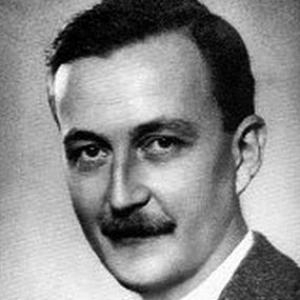Gróf Esterházy János (A mírovi jelképes sírhely a csehországi Mírovban)
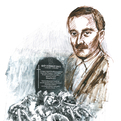
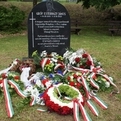
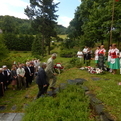
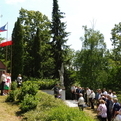



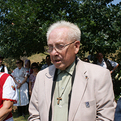

The history of the monument
Who was János Esterházy?
Life facts and milestones
János Kokes
Count János Esterházy (1901–57) was a Hungarian politician from Slovakia who was born in Nyitraújlak, near Nitra, inhabited mostly by Slovaks. Although his mother was Polish (Countess Elzbieta Tarnowska), his family gave him a strong Hungarian national upbringing.
After the dissolution of the historical Hungary and the creation of Czechoslovakia in 1918, the family belonging to the Galanta branch of the Esterházy family lost most of its wealth as a result of the land reform in Czechoslovakia.
He began his political career in the mid-1920s, becoming chairman of the National Christian Socialist Party in 1932 and of the United Hungarian Party in 1936. János Esterházy consistently fought for the survival and rights of Hungarians in Slovakia in the interwar period and again during World War II.
When most of the Hungarian-inhabited regions of southern Slovakia were reannexed to Hungary in 1938, Count János Esterházy remained in Slovakia and once again took the lead of the Hungarians there, which had dwindled to a few tens of thousands. He formed the Hungarian Party of "Slovensko" and was elected to parliament. As the only Hungarian member of the Slovak legislature at the time, in 1942 he abstained along with two fellow Slovaks from voting on the law ordering the deportation of Jews.
After the end of World War II, he was arrested and deported to the Soviet Union. In 1947, under the pretext of collaborating with the fascist regime, the Czechoslovak state authorities declared him a war criminal and sentenced him to death. After the Soviets sent Esterhazy back to Czechoslovakia in 1949, he was imprisoned. However, his sentence was changed to life imprisonment. Esterházy died seriously ill in 1957 in Mírov, Moravia. His political rehabilitation is still rejected by the Czech and Slovak political leaderships.
The seriously ill Esterházy died in prison on March 8, 1957. His body was cremated in the crematorium in Olomouc, but the ashes were not handed over to the family. Since it was not known where Esterházy was buried, Hungarians in the Czech Republic, with Hungarian help, erected a symbolic tomb for him in 1998 in the former prison cemetery, which is exemplary in their care. The tomb is regularly wreathed every year on the anniversary of its erection. The black marble tomb reads: "The Member of Parliament of the Hungarian national minority suffered 12 years in prison in Prague and Bratislava for his faith and people. died in Mirov".
Mirov prison is the most heavily guarded prison in the Czech Republic, where people sentenced to life imprisonment are currently serving their sentences.
In 2007, through the intervention of Esterházy's daughter Alice, with the personal help of Karel Schwarzenberg, then Czech Foreign Minister, Czech historians discovered that Esterházy's urn was not placed in Mirov, but in the common grave of the Motol public cemetery in Prague.
Source:
Kokes János 2015. Magyar emlékek Csehországban. Antall József Tudásközpont, Budapest.
Who was János Esterházy?
Life facts and milestones
János Kokes
Count János Esterházy (1901–57) was a Hungarian politician from Slovakia who was born in Nyitraújlak, near Nitra, inhabited mostly by Slovaks. Although his mother was Polish (Countess Elzbieta Tarnowska), his family gave him a strong Hungarian national upbringing.
After the dissolution of the historical Hungary and the creation of Czechoslovakia in 1918, the family belonging to the Galanta branch of the Esterházy family lost most of its wealth as a result of the land reform in Czechoslovakia.
He began his political career in the mid-1920s, becoming chairman of the National Christian Socialist Party in 1932 and of the United Hungarian Party in 1936. János Esterházy consistently fought for the survival and rights of Hungarians in Slovakia in the interwar period and again during World War II.
When most of the Hungarian-inhabited regions of southern Slovakia were reannexed to Hungary in 1938, Count János Esterházy remained in Slovakia and once again took the lead of the Hungarians there, which had dwindled to a few tens of thousands. He formed the Hungarian Party of "Slovensko" and was elected to parliament. As the only Hungarian member of the Slovak legislature at the time, in 1942 he abstained along with two fellow Slovaks from voting on the law ordering the deportation of Jews.
After the end of World War II, he was arrested and deported to the Soviet Union. In 1947, under the pretext of collaborating with the fascist regime, the Czechoslovak state authorities declared him a war criminal and sentenced him to death. After the Soviets sent Esterhazy back to Czechoslovakia in 1949, he was imprisoned. However, his sentence was changed to life imprisonment. Esterházy died seriously ill in 1957 in Mírov, Moravia. His political rehabilitation is still rejected by the Czech and Slovak political leaderships.
The seriously ill Esterházy died in prison on March 8, 1957. His body was cremated in the crematorium in Olomouc, but the ashes were not handed over to the family. Since it was not known where Esterházy was buried, Hungarians in the Czech Republic, with Hungarian help, erected a symbolic tomb for him in 1998 in the former prison cemetery, which is exemplary in their care. The tomb is regularly wreathed every year on the anniversary of its erection. The black marble tomb reads: "The Member of Parliament of the Hungarian national minority suffered 12 years in prison in Prague and Bratislava for his faith and people. died in Mirov".
Mirov prison is the most heavily guarded prison in the Czech Republic, where people sentenced to life imprisonment are currently serving their sentences.
In 2007, through the intervention of Esterházy's daughter Alice, with the personal help of Karel Schwarzenberg, then Czech Foreign Minister, Czech historians discovered that Esterházy's urn was not placed in Mirov, but in the common grave of the Motol public cemetery in Prague.
Source:
Kokes János 2015. Magyar emlékek Csehországban. Antall József Tudásközpont, Budapest.
Who we remember
